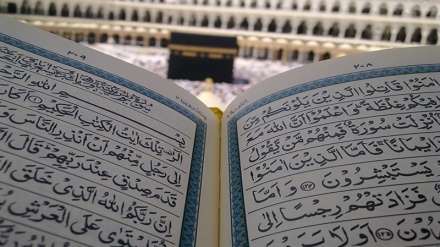Path towards Enlightenment (1029)
Welcome to our latest episode of “Path towards Enlightenment”, which is an endeavour to make you and us familiar with an easy and fluent explanation of God’s Final Scripture to all mankind, the holy Qur’an that was revealed to the Last and Greatest of all Messengers, Prophet Mohammad (blessings of God upon him and his progeny).
As you know, for the past few weeks we have been explaining “Surah Qalam” – the number 68 in the serial order of compilation of the holy Qur’an. Revealed in Mecca, it has 52 Ayahs and opens with a single discrete Arabic letter “Noon” and the Divine Oath by the instrument of “Qalam” or “The Pen”, as well as all knowledge that people are able to preserve and communicate thereby. It enumerates the noble characteristics of the Prophet of Islam and exhorts him to patience and steadfastness while rejecting the accusations of his foes who tried to mock him as insane. It exposes the vices of the enemies of Islam and referring to the inevitability of Resurrection and Final Judgement warns them of Divine Wrath.
A statement from the Prophet speaks of Divine rewards for those who recite Surah Qalam (regularly), while the Prophet’s 6th Infallible Heir, Imam Ja’far as-Sadeq (AS) says recitation of this Surah whether in the obligatory or supererogatory ritual prayers shall be immunity from the pressures of the grave for an observant Muslim.
We continue from where we left you in our last episode of this series and here is Ayah 48:
“So submit patiently to the judgment of your Lord, and do not be like the Man of the Fish (i.e. Prophet Jonah) who called out as he choked with grief.”
If you might recall, in our last episode of this series while explaining the previous Ayahs of this Surah we had said that those guide people and impart religious, spiritual, and ethical values to them should not ask them anything in return as salary or reward, but there is no harm in accepting reasonable presents. We had also said that knowledge of the Unseen is only known to the Almighty Creator and to those of His upright servants to whom He has revealed part of it, and definitely not to the soothsayers, fortune-tellers and those who claim to have dreams of coming events.
The Ayah that we recited to you now commands the Prophet of Islam and the believers to be patient in the face of persecution by the disbelievers and while referring to the account of Prophet Jonah, tells them to desist from haste. It should be noted that Prophet Jonah, tired of the obstinacy of the people who denied his mission and continued to commit sins, made haste in invoking Divine Wrath on the disobedient nation. As a result of abandoning his mission and boarding a ship to travel to some other place, he was chastised by the All-Merciful Lord and was swallowed by a whale when thrown into the sea by his fellow travelers who fearful of the turbulent waters cast lots and pushed him overboard. Now in the stomach of the huge fish his heart was imbued with sorrow, and he fervently beseeched forgiveness and begged for deliverance.
This Ayah teaches us that:
- Those who guide people ought to be patient and extremely clement, without losing hope in Divine Mercy or resorting to any hasty step that is detrimental for fellow humans.
- Prophets were often admonished by the Almighty Creator and reminded of their duties whenever this was required.
Now let us listen to Ayahs 49 and 50 of the same Surah:
“Had it not been for a blessing that came to his rescue from his Lord, he would surely be cast on a bare shore while he was blameworthy.
“So his Lord chose him and made him one of the righteous.”
Prophet Jonah’s prayer and repentance were accepted in the Divine Court and had it not been for God’s Grace he would have been cast out in the state of being blameworthy. The Almighty, however, forgave him and the whale was commanded to cast him out on a deserted shore.
As is clear from Ayah 50, the All-Merciful Lord made him one of the righteous servants and vested him once more with the obligation of guiding his people. He returned to his people and they all believed in him and were granted Divine Bounties.
From these Ayahs we learn that:
- God admonishes even His Prophet if they show an iota of negligence in carrying out their duties.
- Prayers and penitence when accepted in the Divine Court save us from punishment and calamities.
- Sinners and transgressors who repent sincerely should never lose hope in Divine Mercy and are provided ample respite to seek forgiveness by awakening their conscience.
In conclusion of this week’s episode we invite you to listen to the last two Ayahs of Surah Qalam, that is, 51 and 52:
“Indeed the faithless almost devour you with their eyes when they hear the Reminder, and they say, ‘He is indeed crazy.’
“Yet it is just a Reminder for all the nations.”
These closing Ayahs of Surah Qalam resume the point mentioned in the opening Ayahs of this Surah regarding the false ascription of insanity to the Prophet of Islam by the pagan Arabs, who would almost cause his death with their evil eyes upon hearing the recitation of the Holy Qur’an, which is indeed a Reminder, and they falsely claim that he is crazy.
Ayah 52 says that the Qur’an is but an awakening and a Reminder for all nations with its flawless wordings that none can match and its timeless wisdom, full of glad tidings to the believers as well as necessary admonishments.
From these Ayahs we learn the following points:
- The enemies of Islam are hell-bent on tarnishing and destroying the luminous image of the Prophet through ascribing falsity to him.
- The enemies target the Holy Qur’an and the Prophet through propaganda in a vain bid to deceive believers and raise doubts in their minds.
- As the Final Heavenly Scripture for the guidance of all mankind, the Holy Qur’an is a Universal Reminder to awaken the entire humankind. Undoubtedly, the current problems of Muslims have their roots in negligence and abandoning the teachings of this Divine Book.
RM/AS/SS


